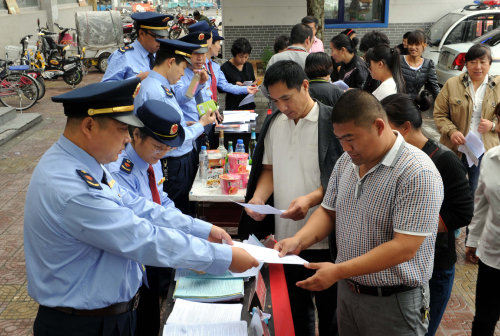|
 |
|
CONSUMER LAW 101: Materials introducing the new consumer rights law are handed out to residents by staff from local industry and commerce authorities in Dachang Hui Autonomous County, north China's Hebei Province, on September 24, 2014 (LI XIAOGUO) |
According to Yang, head of SAIC's Consumer Protection Bureau, the power of the new law has yet to be fully unleashed.
"The revised consumer rights law aims at giving consumers the right to say 'no.' However, its power is still limited at this stage," Yang said. "Right now, 18 provinces have started to revise their local regulations according to the revised consumer rights law in order to intensify consumer protection."
Implementation issues
Although high hopes have been pinned on the revised consumer rights law to prevent personal information leaks as one provision of the new law prohibits it, the implementation of the provision is hardly satisfying--and that's not the only part of the revised law that seems better in theory than in practice.
On March 15, the 315 Evening Gala aired by the China Central Television (CCTV) uncovered consumer rights violations. In conjunction with International Consumer Rights Day, the program has been held for 25
years in a row to expose business misconduct and help consumers protect their rights.
This year, exposed business misconduct includes fraud at famous car brands' dealerships, fake gasoline, deceptive medical advertising and personal information leaks through mobile devices and the Internet.
According to a survey conducted by the CCA, over two thirds of the respondents said their personal information had been leaked or bought during the past year.
Chang, CCA's Secretary General, said the frequent occurrence of personal information leaks has damaged consumers' rights, especially when key consumer information is leaked, such as credit card information.
"Consumers find it hard to prevent the leak, gather evidence of the leak and to claim compensation," Chang said.
Due to these difficulties, most information leak victims choose to keep silent when their rights are trampled on, and only some turn to the court in such cases.
China does not have any law enforcement agency that's specifically dedicated to the protection of personal information, and that function is jointly carried out by different departments. Therefore, sometimes their supervision will overlap with each other, resulting in a problem with jurisdiction, Chang said.
Apart from that, three other obstacles stand in the way of law enforcement, according to Chang.
"The revised consumer rights law increased punitive compensation for consumers from one time the consumption amount to three times. However, in practice, it can hardly be implemented. Another difficulty is that some online retailers deliberately expand the category of products that can be exempted from the seven-day return policy," Chang said. "Last but not least, protection of consumer rights in financial services is hard to carry out because it involves several other laws, and the involved information is too complicated for laymen."
In a bid to make the new law easier to implement, the Regulation on Penalty for Infringement of Consumer Rights and Interests was formulated by the SAIC and took effect on March 15. The regulation clarifies penalties for businesses that fail to abide by the new law.
"Although the consumption environment has substantially improved, some businesses are still taking the risk of infringing consumer rights because the cost of abiding by the law is higher than breaking the law," said Liu, the business law expert with Renmin University of China.
"For consumers, the cost to claim compensation is extremely high. It's like in order to get a chick, they have to kill a cow. That's why so many consumers would rather just take the hit," Liu said.
Countless cases show that when confronted with large companies consumers are often left to their own defenses.
Zheng Yuhuang, an associate professor in marketing at Tsinghua University, said class-action lawsuits should be used in China to reduce the cost for consumers to claim compensation.
The revised consumer rights law has clarified the nature and functions of the CCA--serving the public welfare and emphasizing the social supervision of rights and interests protection. The CCA is allowed to file collective lawsuits against companies by organizing all of the consumers who find their rights have been violated.
"The collective lawsuit is a new function granted to the CCA by the new law. In the future, the CCA should do its job," said Zhang, Minister of the SAIC.
That way, consumers like Zhao Ping can enjoy a cyber-shopping experience fit for royalty.
Copyedited by Kylee Mclntyre
Comments to zhouxiaoyan@bjreview.com
| 